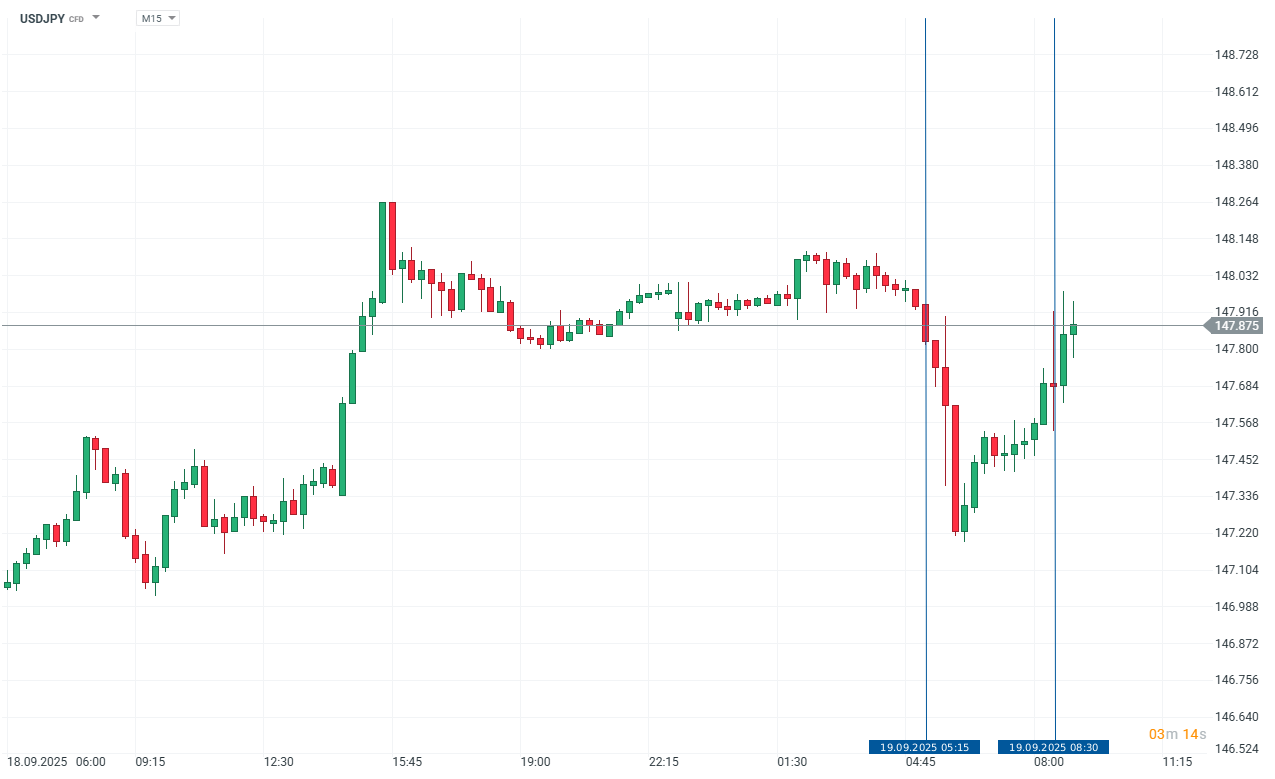-
BOJ kept the policy rate at 0.50% in a 7–2 split; Hajime Takata and Naoki Tamura voted for a hike to 0.75%.
-
A new step toward normalization: BOJ will begin selling its ETF (and J-REIT) holdings, with guidelines of ~¥620bn/year for ETFs, equivalent to about 0.05% of daily trading volume.
-
Following the decision, the yen (JPY) posted strong gains while Japanese equity indices fell. Markets shifted to risk-off mode, with the JP225 losing 1.90%.
-
Expectations for a rate hike at the next meeting on October 29–30 rose to 55%.
BOJ’s decision to keep interest rates unchanged was widely expected by the market. What surprised, however, was the relatively hawkish tone. Two members pushed for a 25bp hike to 0.75%, signaling growing internal pressure for tightening. The shift in rhetoric reflected reduced uncertainty after Japan’s trade agreement with the US and inflation moving closer to target later in BOJ’s three-year projection horizon. Against this backdrop, markets began to price roughly 50/50 odds of a BOJ hike as early as the October 29–30 meeting.
Policy changes
Beyond rates, the new element was BOJ’s plan to reduce its exposure to risk assets. The Bank will start a gradual sale of ETFs (and J-REITs), with reports citing a level of ~¥620bn annually for ETFs. Given the size of BOJ’s current holdings, such a pace would mean the entire process taking over a century. This is by design, as the Bank aims to shrink its market footprint without disruptions.
Market reaction
Today’s BOJ decision was interpreted as a “hawkish hold.” Equities reversed lower (with particular pressure on large tech companies where BOJ’s share is significant), while banks were seen as relative beneficiaries of balance sheet normalization. USDJPY dropped more than 0.52% right after the decision, and swaps quickly repriced October hike odds to 53%.

However, this reaction was largely pared back during BOJ Governor Kazuo Ueda’s press conference. He downplayed the dissenting views of Takata and Tamura, said Japan’s economy is moderately recovering with no material declines in capex, wages, or employment, and pointed to persisting downside risks from tariffs and FX uncertainty. Ueda reiterated that BOJ will continue ETF/J-REIT sales until fully unwound (an indicative pace of 112 years). Policy remains data-dependent, with rate hikes possible if the economy and prices track forecasts. After the press conference, markets retraced the initial post-decision moves and the JPY weakened.


Daily Summary - Powerful NFP report could delay Fed rate cuts

BREAKING: Massive increase in US oil reserves!

US OPEN: Blowout Payrolls Signal Slower Path for Rate Cuts?

BREAKING: US100 jumps amid stronger than expected US NFP report
The material on this page does not constitute as financial advice and does not take into account your level of understanding, investment objectives, financial situation or any other particular needs.
All the information provided, including opinions, market research, mathematical results and technical analyses published on the website or transmitted to you by other means is provided for information purposes only and should in no event be interpreted as an offer of, or solicitation for, a transaction in any financial instrument, nor should the information provided be construed as advice of legal or fiscal nature.
Any investment decisions you make shall be based exclusively on your level of understanding, investment objectives, financial situation or any other particular needs. Any decision to act on information published on the website or transmitted to you by other means is entirely at your own risk. You are solely responsible for such decisions.
If you are in doubt or are not sure that you understand a particular product, instrument, service, or transaction, you should seek professional or legal advice before trading.
Investing in OTC Derivatives carries a high degree of risk, as they are leveraged based products and often small movements in the market could lead to much larger movements in the value of your investment and this could work against you or for you. Please ensure that you fully understand the risks involved, taking into account your investments objectives and level of experience, before trading, and if necessary, seek independent advice.


